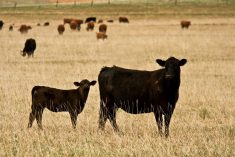Compared to last week, Alberta yearling markets traded $2-$4 on either side of unchanged; however, 800-pound-plus cattle in Manitoba and Saskatchewan appeared to trade $4-$6 higher. Yearling prices across the Prairies are now relatively even with no freight discounts from major southern Alberta markets. Calf markets are becoming more defined with larger volumes on offer. Prices for 500- to 600-lb. calves are nearing historical highs.
Many regions in Western Canada experienced their first frost of the year this past week, which tends to officially start the calf run. Weaning conditions have been favourable, which has enhanced demand from the finishing feedlots for lighter-weight feeder cattle. Despite weakness in the deferred live cattle futures, the deteriorating Canadian dollar continued to underpin the market.
Read Also

U.S. grains: Soy futures post biggest monthly gain in nearly five years on China trade optimism
U.S. soybean futures climbed to a 15-month high and posted their biggest monthly gain in nearly five years on Friday following a rally fueled by the prospect of revived exports to China.
Feed barley prices in the Lethbridge area reached up to $400 per tonne but this did not dampen buying interest. Buyers are anxious to secure ownership as quality yearling supplies will decline over the next month. Cattle on feed numbers are below year-ago levels in Alberta and Saskatchewan and it is that time of year when feedlots start filling.
In central Alberta, Angus-based steers with full health records fresh off grass weighing 925 lbs. dropped the gavel at $225 and tan mixed heifers weighing 870 lbs. were purchased for $225. In the Lethbridge area, Simmental-blended steers weighing 830 lbs. charted the board at $240 and black mixed heifers weighing 830 lbs. were $227. Northwest of Winnipeg, black steers averaging 947 lbs. reached up to $230 and red mixed steers weighing 850 lbs. hit a home run at $250. In east-central Saskatchewan, Angus mixed steers weighing a shade over 900 lbs. plotted the graph at $233. These are all low-flesh cattle fresh off pasture. Larger volumes of yearlings were noted in the eastern Prairie regions this past week.
North of Red Deer, mixed steers on light grain ration with full health data weighing 770 lbs. were valued at $235; however, black steers weighing 710 lbs. fresh off grass charted course at $255. Northwest of Winnipeg, red mixed steers off grass averaging just over 700 lbs. reached up to $267 and Charolais-based heifers weighing 730 lbs. dropped the gavel at $232.
In southwestern Saskatchewan, red steers weighing 535 lbs. were quoted at $288 and Charolais-based heifers weighing just over 500 lbs. were quoted at $244. At Ste. Rose, Man., red and black steer calves weighing 480 lbs. were bid up to $308; in the Lethbridge area, Angus-based steers averaging 494 lbs. silenced the crowd at $295.
There are concerns about beef demand in the rising interest rate environment but this is not currently affecting feeder cattle prices. If unemployment levels remain near historical lows in Canada and the U.S., household incomes should be able to sustain beef prices.
— Jerry Klassen is president and founder of Resilient Capital, specializing in proprietary commodity futures trading and market analysis. Jerry consults with feedlots on risk management and writes a weekly cattle market commentary. He can be reached at 204-504-8339 or via his website at ResilCapital.com.












